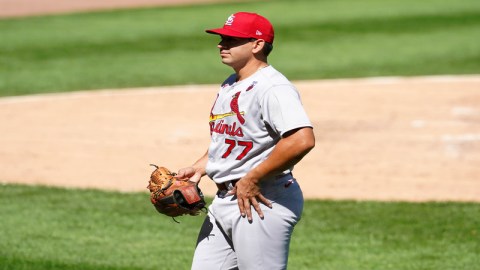Before Sharks winger Devin Setoguchi could even pound the puck into the net in the third period of Tuesday night’s Game 5, Vancouver fans collectively sighed, looked toward the hockey gods and prayed that it wasn’t happening again.
They had just seen their franchise goalie, Roberto Luongo, make an ill-advised play to chase a racing puck deep into the slot. But Luongo was a step slow, allowing Joe Pavelski to tap the puck to Setoguchi, who gave the Sharks a 2-1 lead and plenty of hope that they could scratch their way back into the Western Conference Finals.
That was the ugly, oft-criticized version of Luongo, who has been given the burden of the Canucks’ recent playoff failures.
The great side — the three-time Vezina finalist, 2007 Hart Trophy recipient and potential Hall of Famer — doesn’t get nearly the same amount of attention, though. That part of Luongo, which emerged from the ugly side’s shadow Tuesday, made 54 saves in a brilliant, series-clinching performance against the Sharks. The 3-2 double-overtime victory served as Luongo’s finest NHL hour (and a half).
Luongo has taken the Canucks to the Stanley Cup for the third time in history and the first time since 1994. Finally, he’ll have the ultimate opportunity to prove he’s not soft, or a choker, or that he’s actually more than a simple regular-season superstar.
The 32-year-old has been one of the most debated hockey players of the last decade, though he has claimed to ignore the barrage of condemnation. Quite frankly, that feat would be impossible.
“I play in Vancouver, and [other goalies] don’t, what [are] you going to do?” Luongo told the Vancouver Sun. “Whether that’s fair or not, that’s not up for me to decide. I just go out there and try to do my best every night for myself and teammates. Really, I don’t really pay attention to that. I’m more or less in my bubble. I hear bits and pieces here and there, but I try to just worry about myself. Otherwise, it could affect my game if I do.”
In a large way, Luongo has brought the criticism upon himself. In 2007, he famously missed the first three-plus minutes of overtime in Game 5 of the Western Conference semifinal against the Ducks because he was in the locker room with diarrhea. In double overtime of the same game, Luongo completed the metaphor by yapping at a referee during play, and the Ducks took advantage with a series-clinching goal from 60 feet away.
Bowel movements, especially of the literal variety, make headlines and drive conversation. Because of that, no one talks about his 56 saves that night, or even his 72 saves in the 2007 playoff opener against the Stars.
“Roberto sets such a high standard that if he does let in a goal people don’t expect, he gets criticized more than anybody else,” Canucks general manager Mike Gillis told Sports Illustrated this month.
The quote came from a feature that was appropriately titled, “The Good, The Bad And Roberto Luongo,” which was written on the heels of the Canucks’ Game 1 victory against the Sharks. But even during Luongo’s most joyous moments, he can’t dodge the memories of his shortcomings.
In reality, that’s because the falters are still fresh in everyone’s minds. Luongo lived a nightmare earlier this postseason. He was pulled in Games 4 and 5 of the Canucks’ opening-round series against the Blackhawks because he allowed 10 goals on 40 shots. Then, he was benched for the start of Game 6. If backup Cory Schneider didn’t suffer a late-game injury, there’s no telling whether this story or the Sports Illustrated feature would have even been written.
Before his Game 7 victory against Chicago, Luongo consulted a myriad of supporters, from his brother the goalie coach to a sports psychologist.
“It was the greatest emotional roller coaster of my life,” Luongo told Sports Illustrated. “Maybe I had to hit the bottom to get back to the top.”
There have been other episodes, too. After the Canucks fell 7-5 to Chicago in a series-ending loss in 2009, the Vancouver media believed Luongo should get traded due to a high salary that didn’t appropriately back his performance. Instead, just a few months later, the Canucks signed Luongo to a 12-year, $64 million deal that will keep him under contract until he’s 43 years old. That, right there, was a mighty swing of momentum that only egged on his doubters.
The following season, in the 2010 playoffs, the Canucks blew a 3-1 series lead to the Blackhawks, and the media clamored over Luongo’s captaincy, which was unconventionally awarded to him prior to the 2008-09 season. The media and fan base wanted it stripped, and Luongo soon obliged, resigning as captain prior to the 2010-11 season.
Maybe that’s the difference this year, though the Chicago series might suggest otherwise, even if it did end in a more positive fashion. Or maybe the criticism was pointed in the wrong direction, as the face of the franchise garnered too much of the burden. Maybe, though, that was an unwelcomed responsibility, and the pressure of the captaincy was too much responsibility for the Montreal native to bear.
Then again, his numbers manage to suggest otherwise. For all of Luongo’s regular-season achievements (2.53 goals-against average, .919 save percentage), his career statistics are a tick better in the playoffs (2.40, .920).
It’s all part of Luongo’s legend. Now, the undeniable answer is before him. With four more victories, those questions will stop.
“I get tons of questions when some people question a goal he might have let in,” Canucks coach Alain Vigneault told the Vancouver Sun. “I was curious the way he played such a great game and nobody asked.”



